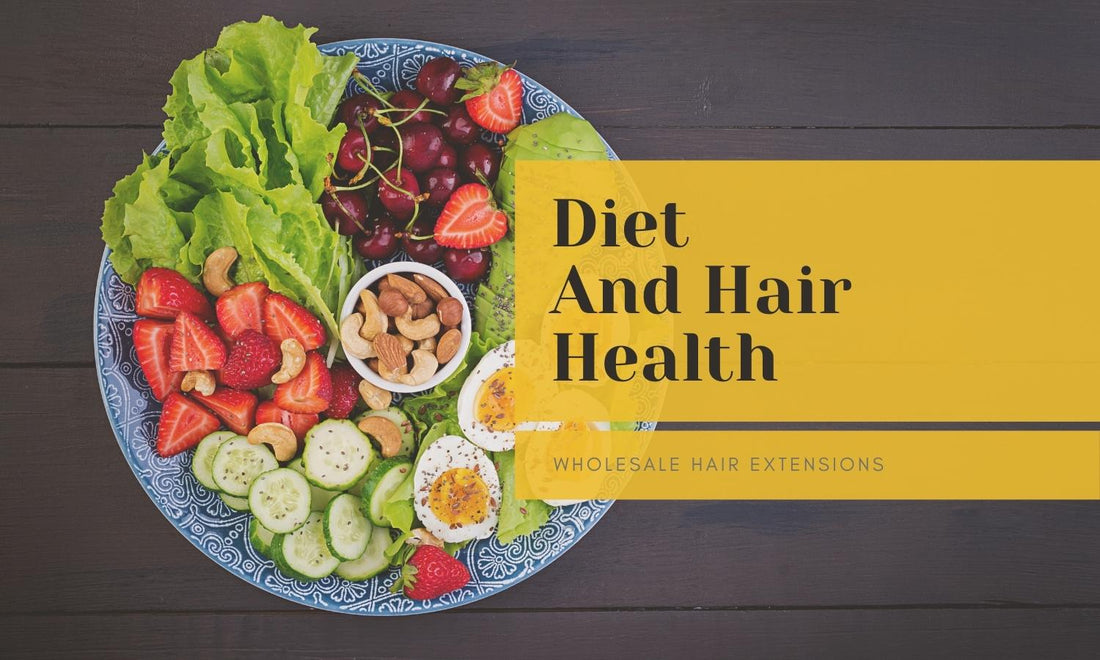
How Does Your Diet Affect Your Hair?
Share
Have you ever wondered why your hair sometimes looks dull, feels brittle, or even starts falling out?
Believe it or not, your diet plays a significant role in the health of your hair.
While shampoos, conditioners, and hair masks can help, the foundation of luscious, healthy hair starts from within—what you eat matters!
Let’s dive into how your daily diet impacts your hair, and what you can do to nourish it naturally.

The Hair and Diet Connection
Your hair is mostly made of a protein called keratin, and just like any other part of your body, it needs the right nutrients to grow strong and stay healthy.
Without a balanced diet, your hair may lack the essential building blocks it requires, leading to problems like hair loss, dullness, or slow growth.
Think of it this way: if your body isn’t getting enough nutrients, it prioritizes essential functions like keeping your heart beating, and hair health takes a backseat.
1. Protein: The Building Block of Hair
- Why It’s Important: Hair is primarily made of protein, so a diet lacking in protein can weaken your strands, making them brittle and prone to breakage.
- What to Eat: Eggs, chicken, fish, lentils, beans, and nuts are excellent sources of protein. If you’re vegetarian or vegan, tofu and quinoa are fantastic alternatives.
2. Iron and Hair Growth
- Why It’s Important: Iron helps red blood cells carry oxygen to your hair follicles. Low iron levels, known as anemia, are one of the leading causes of hair loss, especially in women.
- What to Eat: Leafy greens like spinach, kale, red meat, and fortified cereals are packed with iron. Pairing iron-rich foods with vitamin C (like oranges) can enhance absorption.
 3. Omega-3 Fatty Acids: Shine and Strength
3. Omega-3 Fatty Acids: Shine and Strength
- Why It’s Important: Omega-3 fatty acids keep your scalp healthy and your hair hydrated. They also add a natural shine to your locks.
- What to Eat: Fatty fish like salmon, mackerel, and sardines are great sources. If you’re not into fish, flaxseeds, chia seeds, and walnuts are plant-based options.
4. Vitamins A and E: Scalp and Hair Health
- Why They’re Important: Vitamin A helps your scalp produce sebum, a natural oil that keeps your hair moisturized. Vitamin E is an antioxidant that promotes scalp circulation and prevents damage.
- What to Eat: Carrots, sweet potatoes, almonds, and sunflower seeds are nutrient-rich choices for these vitamins.
5. Biotin: The Hair Growth Hero
- Why It’s Important: Biotin, a B vitamin, is often called the "hair growth vitamin." It strengthens hair and prevents thinning.
- What to Eat: Eggs, almonds, sweet potatoes, and bananas are natural sources of biotin. Biotin supplements can also help if your diet falls short.
6. Hydration: Don’t Forget Water!
- Why It’s Important: Dehydration can leave your hair dry, brittle, and prone to split ends. Staying hydrated keeps your scalp healthy and hair shiny.
- What to Drink: Aim for at least 8 glasses of water a day, and consider herbal teas or coconut water for added hydration.
 Foods to Avoid for Healthy Hair
Foods to Avoid for Healthy Hair
Just as there are foods that nourish your hair, there are also foods that can harm it.
Avoid these whenever possible:
- Sugar: Too much sugar can lead to inflammation, affecting hair follicles.
- Processed Foods: They lack nutrients and often contain harmful additives.
- Excess Alcohol: Can dehydrate your body and scalp.
Conclusion: Feed Your Hair with Love
The old saying "you are what you eat" couldn’t be truer when it comes to your hair.
A balanced diet rich in proteins, vitamins, and minerals is the secret to strong, shiny, and healthy hair.
If you’re noticing hair troubles, take a closer look at your diet—it might be time to swap those chips for a handful of almonds!
Your journey to healthier hair starts on your plate. So, what will you eat today to make your hair happy?
If you have a severe hair loss problem you can get wigs for alopecia.
There are many options you can go with, like afro kinky wigs and deep curly wigs.

